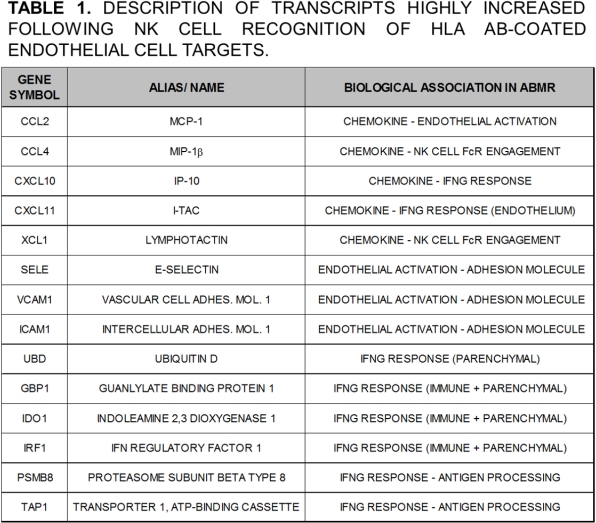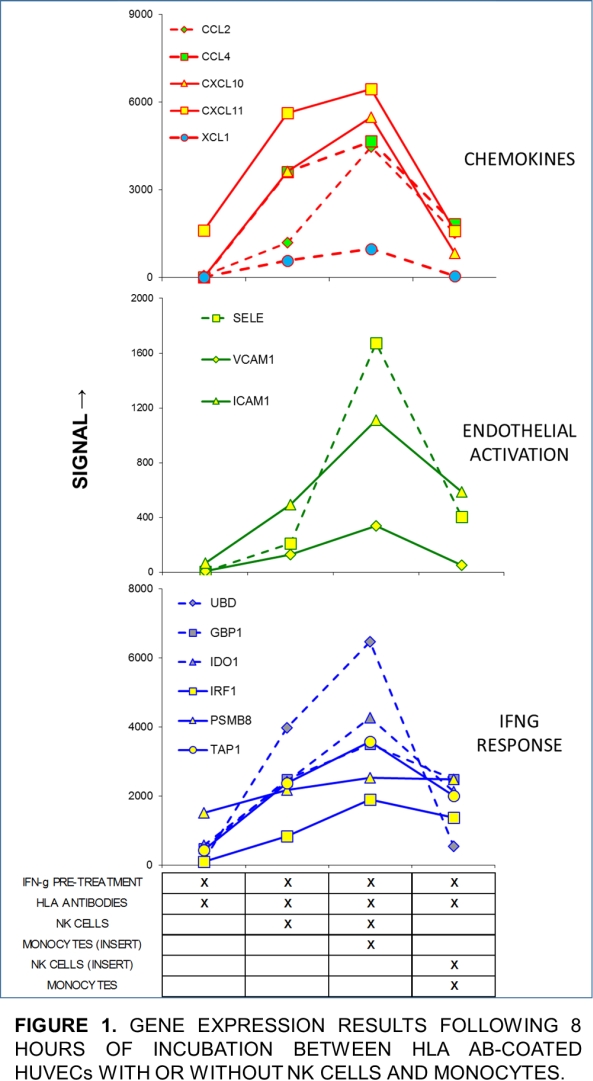An In Vitro Model of Human Antibody-Mediated Rejection Depicts Key Role for NK Cells
1Lab. Med. and Pathology, University of Alberta, Edmonton, AB, Canada
2Paris Cardiovascular Research Center INSERM, Paris, France.
Meeting: 2018 American Transplant Congress
Abstract number: B11
Keywords: Effector mechanisms, HLA antibodies, Natural killer cells, Rejection
Session Information
Session Name: Poster Session B: Acute and Chronic Graft Injury
Session Type: Poster Session
Date: Sunday, June 3, 2018
Session Time: 6:00pm-7:00pm
 Presentation Time: 6:00pm-7:00pm
Presentation Time: 6:00pm-7:00pm
Location: Hall 4EF
AIM: Antibody-mediated rejection (ABMR) is the leading cause of kidney allograft loss but its immune mechanisms are incompletely understood. We sought to examine key interactions using an in vitro model of human ABMR.
METHODS: Human umbilical vein endothelial cells (HUVECs) targets were pretreated with IFNG to maximize HLA expression. HLA abs were derived from pooled sera from highly sensitized patients. Primary NK cells and monocytes were isolated from healthy PBMCs and added to HLA ab-coated HUVECs directly or onto inserts. NK cells on inserts were activated by anti-CD16 coated beads. Global gene expression was assessed after 8 hours.
RESULTS: HLA ab alone served as control in all analyses. NK cells+HLA ab increased 141 transcripts >5-fold. Biologic attribution of the transcripts focused on: chemokines, IFNG response, and endothelial activation. 14 transcripts representing these 3 processes were examined (Table1). All proinflammatory chemokines analyzed increased when NK cells were added onto HUVECs (Fig.1), particularly CXCL10/11, and CCL4. The addition of monocytes to inserts maximized expression of all chemokines, especially CCL2. In contrast, addition of monocytes directly onto HUVECs with CD16-activated NK cells on inserts showed lower levels of induction than NK cells on HUVECs. Maximal increased expression with NK cells on HLA ab-coated HUVEC and monocytes in insert was a common trend also observed for endothelial activation and IFNG response transcripts.
CONCLUSIONS: Our model of human ABMR demonstrates endothelial activation and robust IFNG response following NK cell recognition of HLA ab-coated endothelial targets. The findings argue for a key effector role by NK cells in ABMR that is enhanced by monocyte soluble mediators.
CITATION INFORMATION: Hidalgo L., Racape M., Loupy A., Lefaucheur C. An In Vitro Model of Human Antibody-Mediated Rejection Depicts Key Role for NK Cells Am J Transplant. 2017;17 (suppl 3).
To cite this abstract in AMA style:
Hidalgo L, Racape M, Loupy A, Lefaucheur C. An In Vitro Model of Human Antibody-Mediated Rejection Depicts Key Role for NK Cells [abstract]. https://atcmeetingabstracts.com/abstract/an-in-vitro-model-of-human-antibody-mediated-rejection-depicts-key-role-for-nk-cells/. Accessed February 18, 2026.« Back to 2018 American Transplant Congress


